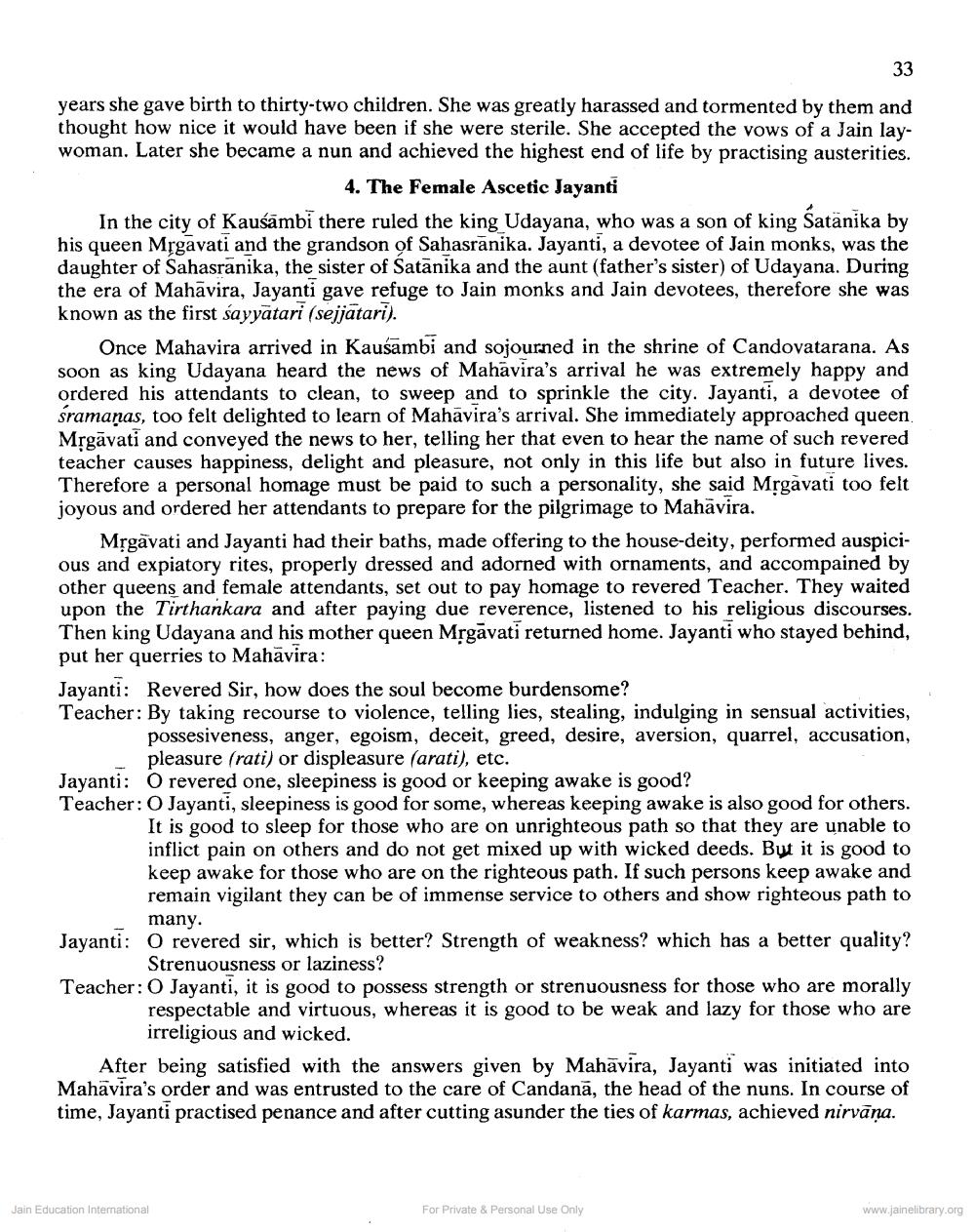________________
33
years she gave birth to thirty-two children. She was greatly harassed and tormented by them and thought how nice it would have been if she were sterile. She accepted the vows of a Jain laywoman. Later she became a nun and achieved the highest end of life by practising austerities.
4. The Female Ascetic Jayanti In the city of Kausāmbi there ruled the king Udayana, who was a son of king Satanika by his queen Mrgavati and the grandson of Sahasranika. Jayanti, a devotee of Jain monks, was the daughter of Sahasranika, the sister of Satānika and the aunt (father's sister) of Udayana. During the era of Mahavira, Jayanti gave refuge to Jain monks and Jain devotees, therefore she was known as the first sayyātari (sejjatari).
Once Mahavira arrived in Kausambi and sojourned in the shrine of Candovatarana. As soon as king Udayana heard the news of Mahavira's arrival he was extremely happy and ordered his attendants to clean, to sweep and to sprinkle the city. Jayanti, a devotee of sramaņas, too felt delighted to learn of Mahavira's arrival. She immediately approached queen. Mrgāvati and conveyed the news to her, telling her that even to hear the name of such revered teacher causes happiness, delight and pleasure, not only in this life but also in future lives. Therefore a personal homage must be paid to such a personality, she said Mrgavati too felt joyous and ordered her attendants to prepare for the pilgrimage to Mahavira.
Mrgavati and Jayanti had their baths, made offering to the house-deity, performed auspicious and expiatory rites, properly dressed and adorned with ornaments, and accompained by other queens and female attendants, set out to pay homage to revered Teacher. They waited upon the Tirthankara and after paying due reverence, listened to his religious discourses. Then king Udayana and his mother queen Mrgāvati returned home. Jayanti who stayed behind, put her querries to Mahavira: Jayanti: Revered Sir, how does the soul become burdensome? Teacher: By taking recourse to violence, telling lies, stealing, indulging in sensual activities,
possesiveness, anger, egoism, deceit, greed, desire, aversion, quarrel, accusation,
pleasure (rati) or displeasure (arati), etc. Jayanti: O revered one, sleepiness is good or keeping awake is good? Teacher: Jayanti, sleepiness is good for some, whereas keeping awake is also good for others.
It is good to sleep for those who are on unrighteous path so that they are unable to inflict pain on others and do not get mixed up with wicked deeds. But it is good to keep awake for those who are on the righteous path. If such persons keep awake and remain vigilant they can be of immense service to others and show righteous path to
many. Jayanti: O revered sir, which is better? Strength of weakness? which has a better quality?
Strenuousness or laziness? Teacher: Jayanti, it is good to possess strength or strenuousness for those who are morally
respectable and virtuous, whereas it is good to be weak and lazy for those who are
irreligious and wicked. After being satisfied with the answers given by Mahāvira, Jayanti was initiated into Mahavira's order and was entrusted to the care of Candanā, the head of the nuns. In course of time, Jayanti practised penance and after cutting asunder the ties of karmas, achieved nirvana.
Jain Education International
For Private & Personal Use Only
www.jainelibrary.org




